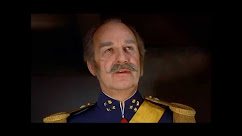It praises the desire of the true artist to create and, moreover, to reach an audience with that creation: "Through all the world there goes one long cry of the artist: Give me leave to do my utmost."
The movie itself is great art--without being message-loaded or heavy-handed with its themes.
One major theme is grace, as interpreted by the general--and Martine.
Years ago, the general visited the tiny community, which is comprised of a Calvinist sect and other community members, such as the postmaster/store owner. At the time, the general, Lorens, was a young lieutenant waffling through life. During his visit, he met Martine and fell in love. Yet he was perceptive enough to realize that marriage was more or less out of the question. He returned to court, married a lady-in-waiting, and took his place on the world stage to become a general.
Years later, he is visiting his aunt, a wealthy woman and patron of the tiny sect. He determines to revisit the group on the birthday of the now-deceased minister, the father of Martine and her sister Philippa. He wants to see if he made the right choice so many years before.
Unknown to him, Martine and Philippa took in a Frenchwoman, Babette, years earlier when Babette's family was killed during uprisings in Paris in the 1870s. When Babette wins a lottery, she requests the opportunity to prepare a "real French dinner" for the deceased minister's birthday. The sisters don't realize until later that Babette spent all the lottery money (10,000 francs) on the meal (converting historical money is practically impossible but the meal she creates for 12 people is well over $5,000).From a writing point of view, having the general at the feast provides the viewpoint of an "insider," a connoisseur who knows the value of the wine and caviar, etc. that Babette presents.
His presence provides a thematic purpose as well. Although Martine is a good religious woman, full of piety as well as fears that the meal will corrupt her deceased father's flock, she is still human and mortal. Although she might dismiss such vain thoughts, having an ex-suitor show up for a simple dinner and coffee would be humiliating. Maybe she shouldn't feel that way, but I dare any person with an ex-lover/suitor/somebody not to feel that way.
Likewise, if the general had shown up to a simple dinner in a comparative hovel, he likely would have left as conflicted as when he arrived. Should he have abandoned worldly pursuits for a simple life? Wasn't his choice better? Maybe not, but borderline poverty is truly not that attractive. So what did he waste his life on instead? Social climbing? Were there no good options?Instead, the general is fed a sumptuous dinner surrounded by simple folk who treat the whole thing as commonplace (to avoid embarrassing the sisters). He is delighted, buoyed up. He brings his worldly knowledge to the banquet, but his worldly knowledge never descends into social posturing. Instead, his approach to the meal inspires others. He focuses on the food, on the company, on the experience. (He also gives Babette a chance to satisfy not only the women she loves and the villagers she cares for but a man who recognizes the brilliance of her creations.)
This is the grace of a God I gladly believe in.





No comments:
Post a Comment